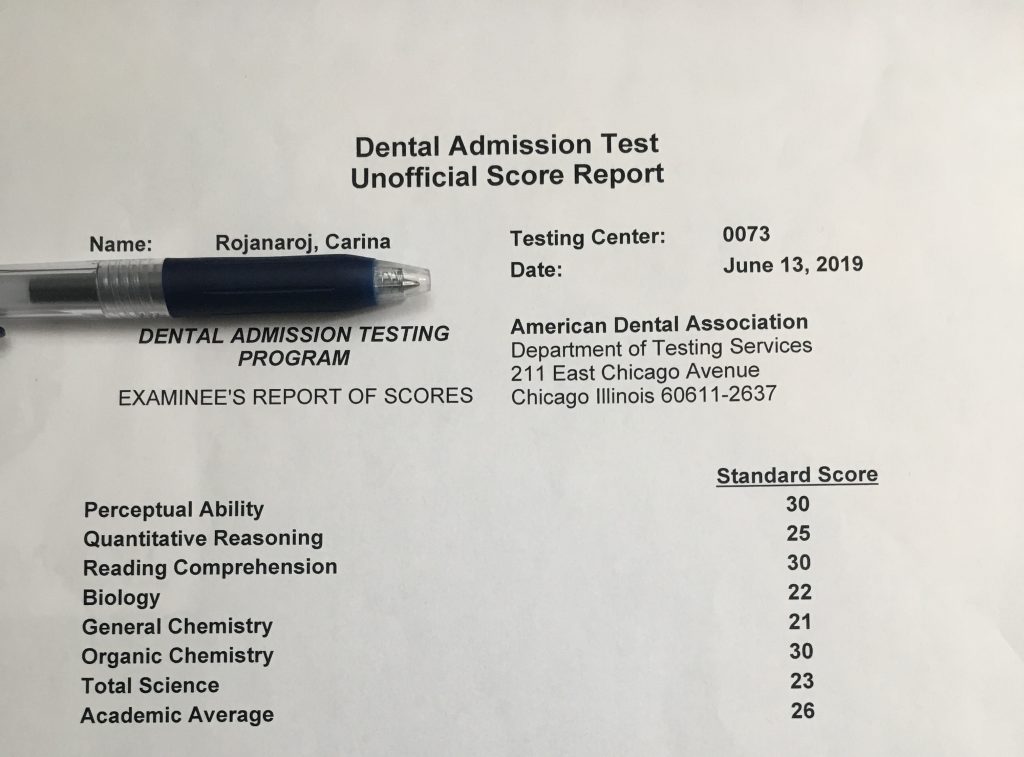Carina Rojanaroj | 26 AA

Perhaps the most crucial piece of advice I have is to start studying early. Not so early that you have not yet covered the material in college classes, but early enough so that there is ample time for you to cover all of the material without burning out. I believe that it is best to take the DAT in the summer or during a time when there are not many classes or responsibilities on your plate. This makes it so that you can schedule reasonable breaks in between studying without feeling too guilty or having to worry about much else hovering over your head. Plus, if you study early, you have enough time to employ the method of spaced repetition: showing yourself material and going over it intermittently to reinforce the information over the span of weeks or months. This helps you memorize and understand the information better so as to eliminate the amount of uncertainty you have on test day.
The second piece of advice is to not underestimate the value of testing yourself and using practice questions. However, practice questions should be used appropriately. You should not expect to see the same exact questions on the real DAT, and as such, you should not memorize sequences of words for biology or general chemistry questions. Instead, you should use the questions to see which concepts you are weak on and emphasize studying those topics. This is where spaced repetition comes into play. You should focus on topics that are harder for you personally, but at the same time, you should not lose your insight on the material you are stronger in. For this reason, it is important to still keep the “easier” topics in your studying rotation, but make sure you see them less frequently than the harder topics so that you can build your strength.
How did you use Crack the DAT to prepare for the DAT?
I used Crack the DAT mostly for practice questions. I placed a lot of emphasis on PAT, and I used the PAT questions every day for constant training. Before going through the questions for the sections that make up the academic average, I reviewed the relevant material that would be on the DAT using my notes from classes and Bio notes. I also used Chad’s videos for chemistry before consulting Crack the DAT. Once I reviewed the material, I tested myself with the practice questions. I simulated the conditions of a testing environment and went through all of the questions that would normally be on the real DAT: 100 science, 90 PAT, 50 reading, and 40 math. Upon completion, I would check over the questions I got wrong and the questions that I was unsure about, regardless of whether I answered them correctly or not. I went through every answer choice on these questions and made sure I understood not only why the correct answer was right, but also why all of the other possible answer choices were wrong. After completing this, I would review the subsections that I did not perform well on.
I believe that because of the vast amount of material that is covered, Crack the DAT’s incredibly large question bank allows me to cycle through material in an efficient manner. The explanations were also incredibly helpful for the concepts that I did not have as good of a grasp on. Also, while doing the questions, I simultaneously familiarized myself with the look, feel, time constraints, tools (like calculator or periodic table), and question styles that are similar to those on the real DAT. I found that on test day, these experiences were a good representation of what I had to work with in the Prometric center.
What would you do differently to prepare for the DAT?
If I could go back and change how I studied, I think that I would have spent more time on the biology section of the DAT. For this, I should have started earlier and focused more on the breadth of topics that could be asked about rather than the depth. I (and many other people) found that the biology questions on the actual DAT were not very detailed and placed emphasis on “big picture” concepts. If I had thought more about the large span of questions and did not worry so much about the details, I think I would have performed better and raised my academic average and total science scores.
I also think I had too much confidence in my general chemistry skills when going into the test. I was consistently getting the vast majority of practice questions correct when I was going through general chemistry, so I did not focus a lot of my attention to that section. This might be the reason why I scored the lowest in that section out of all of my subscores, and this made me realize the importance of spaced repetition, even for the subjects and topics that I am stronger in.
Additionally, I would have spent more time learning how to answer the sufficiency logic questions on the quantitative reasoning section. While I was studying, I figured that questions on that topic would be so rare that spending a lot of time learning how exactly to solve them would be useless. However, I think that learning how to do those would have also helped me on the other logical questions (where a set of conditions are given and I would have to determine if A

